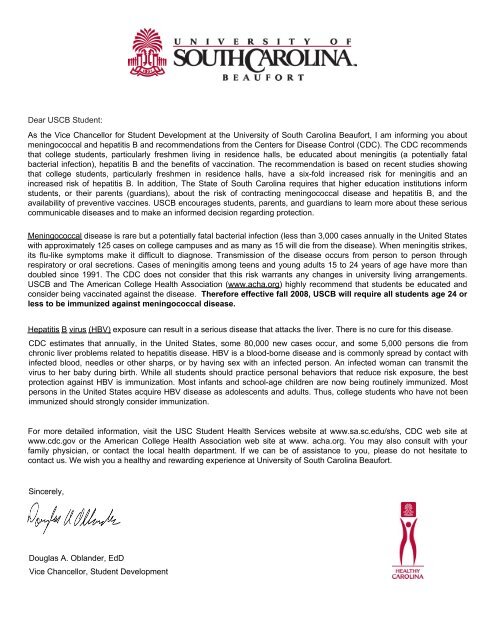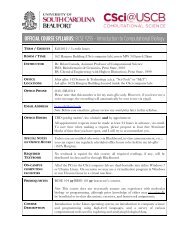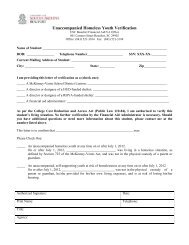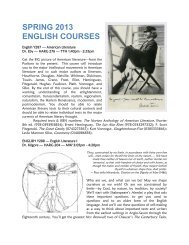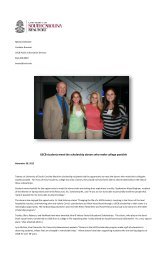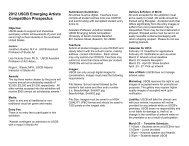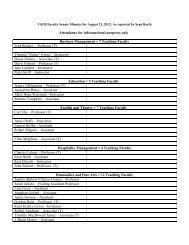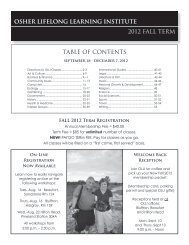Dear USCB Student:As the Vice Chancellor for Student Development at the <strong>University</strong> <strong>of</strong> <strong>South</strong> <strong>Carolina</strong> <strong>Beaufort</strong>, I am informing you aboutmeningococcal and hepatitis B and recommendations from the Centers for Disease Control (CDC). The CDC recommendsthat college students, particularly freshmen living in residence halls, be educated about meningitis (a potentially fatalbacterial infection), hepatitis B and the benefits <strong>of</strong> vaccination. The recommendation is based on recent studies showingthat college students, particularly freshmen in residence halls, have a six-fold increased risk for meningitis and anincreased risk <strong>of</strong> hepatitis B. In addition, The State <strong>of</strong> <strong>South</strong> <strong>Carolina</strong> requires that higher education institutions informstudents, or their parents (guardians), about the risk <strong>of</strong> contracting meningococcal disease and hepatitis B, and theavailability <strong>of</strong> preventive vaccines. USCB encourages students, parents, and guardians to learn more about these seriouscommunicable diseases and to make an informed decision regarding protection.Meningococcal disease is rare but a potentially fatal bacterial infection (less than 3,000 cases annually in the United Stateswith approximately 125 cases on college campuses and as many as 15 will die from the disease). When meningitis strikes,its flu-like symptoms make it difficult to diagnose. Transmission <strong>of</strong> the disease occurs from person to person throughrespiratory or oral secretions. Cases <strong>of</strong> meningitis among teens and young adults 15 to 24 years <strong>of</strong> age have more thandoubled since 1991. The CDC does not consider that this risk warrants any changes in university living arrangements.USCB and The American College Health Association (www.acha.org) highly recommend that students be educated andconsider being vaccinated against the disease. Therefore effective fall 2008, USCB will require all students age 24 orless to be immunized against meningococcal disease.Hepatitis B virus (HBV) exposure can result in a serious disease that attacks the liver. There is no cure for this disease.CDC estimates that annually, in the United States, some 80,000 new cases occur, and some 5,000 persons die fromchronic liver problems related to hepatitis disease. HBV is a blood-borne disease and is commonly spread by contact withinfected blood, needles or other sharps, or by having sex with an infected person. An infected woman can transmit thevirus to her baby during birth. While all students should practice personal behaviors that reduce risk exposure, the bestprotection against HBV is immunization. Most infants and school-age children are now being routinely immunized. Mostpersons in the United States acquire HBV disease as adolescents and adults. Thus, college students who have not beenimmunized should strongly consider immunization.For more detailed information, visit the USC Student Health Services website at www.sa.sc.edu/shs, CDC web site atwww.cdc.gov or the American College Health Association web site at www. acha.org. You may also consult with yourfamily physician, or contact the local health department. If we can be <strong>of</strong> assistance to you, please do not hesitate tocontact us. We wish you a healthy and rewarding experience at <strong>University</strong> <strong>of</strong> <strong>South</strong> <strong>Carolina</strong> <strong>Beaufort</strong>.Sincerely,Douglas A. Oblander, EdDVice Chancellor, Student Development
<strong>University</strong> <strong>of</strong> <strong>South</strong> <strong>Carolina</strong> <strong>Beaufort</strong>This <strong>Form</strong> MUST be returned to: Admissions Office, <strong>University</strong> <strong>of</strong> <strong>South</strong> <strong>Carolina</strong> <strong>Beaufort</strong>By U.S. Mail: USCB Admissions OfficeOne <strong>University</strong> BoulevardBluffton, SC 29909In Person: Student Services Hargray Building or Fax to: (843) 208-8290TO BE COMPLETED BY THE STUDENTIMMUNIZATION RECORDName:___________________________________________________________________________Last Name First Name MiddleAddress: ___________________________________________________________________Street /P.O. Box___________________________________________________________________City State Zip CodePhone: _______________________ Email _______________________________________First Term <strong>of</strong> Enrollment (circle term and insert year): Fall / Spring / Summer ____________(Student ID#)Date <strong>of</strong> BirthMonth Day YearAge at the time you willenter the <strong>University</strong>Student Signature: _______________________________________________________________________________________Section A - REQUIRED IMMUNIZATIONSMust be completed and signed by your health care provider.1. M.M.R. (Measles, Mumps, Rubella) (two doses required for students born in 1957 or later)a. Dose 1 given at age 12-15 months or later..................................................................................... #1 ____ / ____ / ____M D YDose 2 given at age 4-6 years or later, and at least one month after the first dose......................ORb. Laboratory/serologic evidence <strong>of</strong> immunity (attach copy <strong>of</strong> titer and date)ORc. Exemption: I was born before 1957, and therefore am exempt from this requirement#2 ____ / ____ / ____M D Y2. Meningitis Vaccine - Pro<strong>of</strong> <strong>of</strong> receipt <strong>of</strong> the Meningococcal Vaccine or a signed waiver declining the vaccine is required <strong>of</strong> allstudents (incoming freshmen, under age 25), at the <strong>University</strong> <strong>of</strong> <strong>South</strong> <strong>Carolina</strong> <strong>Beaufort</strong> beginning fall semester 2008. A parentsignature is required for students under the age <strong>of</strong> 18 if declining vaccine. If it has been between 2-5 years since you have beenvaccinated with Menomune, you should receive the Menactra vaccine. If it has been more than 5 years since you have been vaccinatedwith Menomune, then you are required to recieve a Menactra vaccine or sign a waiver declining the vaccine.ORMenactraMenomuneDate <strong>of</strong> administration ____ / ____ / ____Date <strong>of</strong> administration ____ / ____ / ____Declined (signature required) ____________________________________________ Date _____________________ADDITIONAL IMMUNIZATION REQUIREMENT FOR INTERNATIONAL STUDENTSTUBERCULOSIS SCREENINGAre you a member <strong>of</strong> a high-risk group1 or are you entering the health pr<strong>of</strong>essions? YES ______ NO ______ If NO, Youare not required to have a TB screening. If YES, you are required to have a TB screening. A history <strong>of</strong> BCG vaccinationshould not preclude testing <strong>of</strong> a member <strong>of</strong> a high-risk group. BCG is not acceptable to meet requirement.1. Tuberculin Skin Test:Date Given: ____ / ____ / ____Date Read: ____ / ____ / ____M D Y M D YResult: ________________ (Record actual mm <strong>of</strong> induration, transverse diameter; if no induration, write "0")Interpretation (based on mm if induration as well as risk factors): positive ______ negative ______2. Chest x-ray (required if tuberculin skin test is positive) result: normal ______ abnormal ______Date <strong>of</strong> chest x-ray: ____ / ____ / ____M D Y1. Categories <strong>of</strong> high risk students include those students who have arrived within the past 5 years from countries where TB is endemic. It is easier to identify countries <strong>of</strong> lowrather than high TB prevalence. Therefore, students should undergo TB screening if they have arrived from countries EXCEPT those on the following list: Canada,Jamaica, Saint Kitts and Nevis, Saint Lucia, USA, Virgin Islands (USA), Belgium, Denmark, Finland, France, Germany, Greece, Iceland, Ireland, Italy, Liechtenstein,Luxembourg, Malta, Monaco, Netherlands, Norway, San Marino, Sweden, Switzerland, United Kingdom, American Samoa, Australia, or New Zealand.See Reverse For Recommended <strong>Immunization</strong>s


